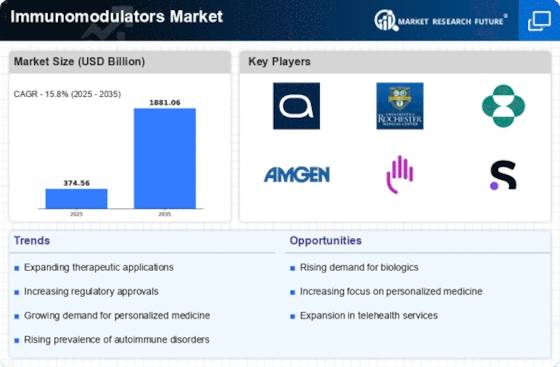Advancements in Biotechnology
Technological advancements in biotechnology are significantly influencing the Immunomodulators Market. Innovations in drug development, such as monoclonal antibodies and biologics, have revolutionized the treatment landscape for various diseases. The market for biologics is projected to reach substantial figures, with estimates suggesting it could surpass USD 300 billion by 2025. These advancements enable the creation of targeted therapies that modulate the immune response more effectively than traditional treatments. As a result, the demand for immunomodulators is expected to rise, driven by the need for more precise and personalized treatment options. Furthermore, the integration of artificial intelligence in drug discovery processes may expedite the development of new immunomodulatory agents, thereby enhancing the overall market dynamics.
Rising Awareness of Immunotherapy
There is a growing awareness of immunotherapy as a viable treatment option, which is positively impacting the Immunomodulators Market. Patients and healthcare professionals are increasingly recognizing the potential of immunomodulators in treating various diseases, including cancers and chronic inflammatory conditions. This awareness is being fueled by educational campaigns and the dissemination of information through various media channels. As a result, the market for immunotherapy is projected to grow significantly, with estimates suggesting a potential market size of USD 100 billion by 2027. The increasing acceptance of immunotherapy is likely to drive demand for immunomodulators, as more patients seek these innovative treatment options. This trend may also encourage pharmaceutical companies to invest in the development of new immunomodulatory agents, further enhancing market dynamics.
Growing Prevalence of Autoimmune Disorders
The rising incidence of autoimmune disorders is a pivotal driver for the Immunomodulators Market. Conditions such as rheumatoid arthritis, lupus, and multiple sclerosis are becoming increasingly common, necessitating effective treatment options. According to recent estimates, autoimmune diseases affect approximately 5-8% of the population in various regions, leading to a heightened demand for immunomodulatory therapies. This trend is likely to continue, as awareness and diagnosis of these conditions improve. Consequently, pharmaceutical companies are investing in research and development to create innovative immunomodulators that can address these complex diseases. The increasing prevalence of autoimmune disorders not only drives market growth but also encourages collaboration among researchers and healthcare providers to enhance treatment outcomes.
Regulatory Support for Innovative Therapies
Regulatory bodies are increasingly supportive of innovative therapies, which is a crucial driver for the Immunomodulators Market. Streamlined approval processes and incentives for the development of novel immunomodulators are encouraging pharmaceutical companies to invest in research and development. Recent initiatives by regulatory agencies aim to expedite the approval of breakthrough therapies, particularly those addressing unmet medical needs. This supportive regulatory environment is likely to foster innovation and enhance the availability of new immunomodulatory treatments in the market. As a result, the Immunomodulators Market is expected to witness accelerated growth, driven by the introduction of advanced therapies that can effectively modulate the immune response. This trend may also lead to increased competition among manufacturers, ultimately benefiting patients through improved treatment options.
Increasing Investment in Healthcare Research
The Immunomodulators Market is experiencing growth due to increased investment in healthcare research. Governments and private entities are allocating substantial funds to explore new therapeutic avenues for immune-related conditions. This trend is evident in various regions, where research grants and funding for clinical trials are on the rise. For instance, funding for immunology research has seen a significant uptick, with projections indicating a compound annual growth rate of over 5% in the coming years. Such investments not only facilitate the development of novel immunomodulators but also foster collaboration between academic institutions and pharmaceutical companies. This collaborative environment is likely to yield innovative solutions that address unmet medical needs, further propelling market expansion.

















